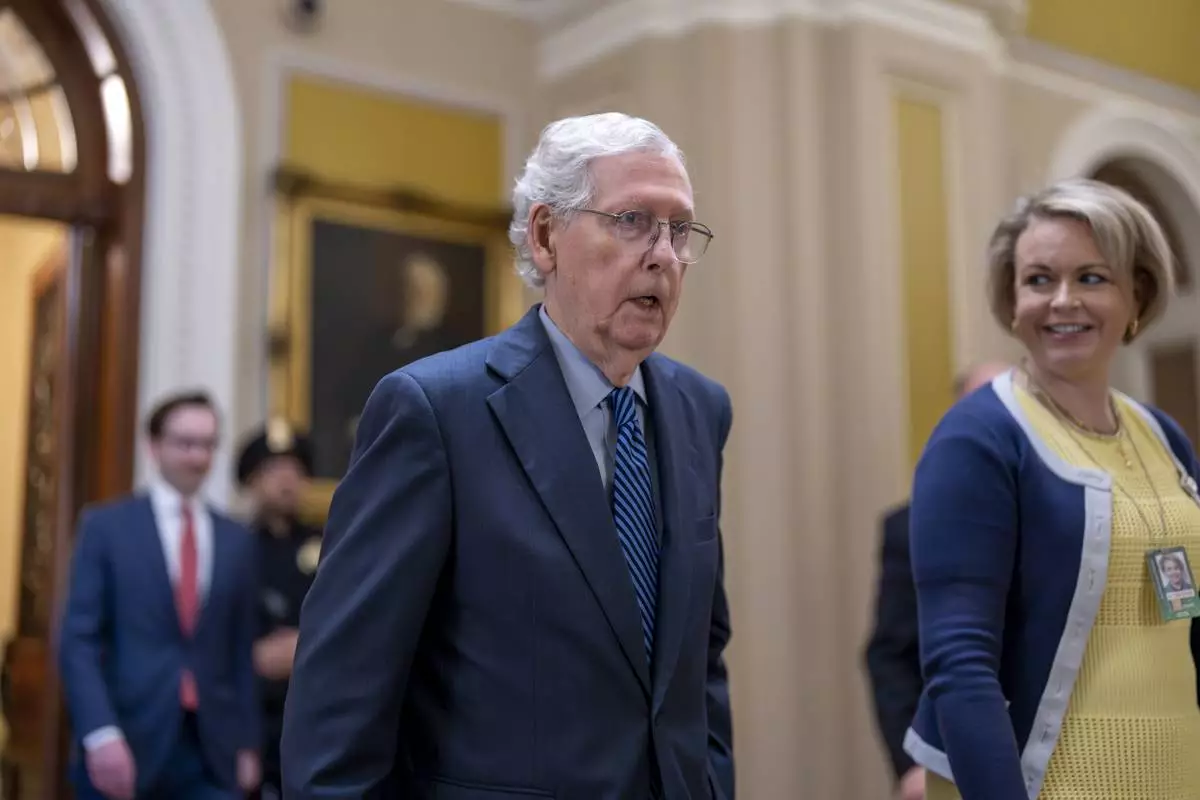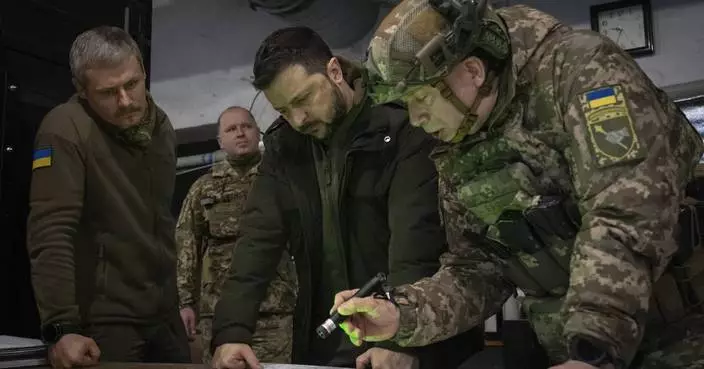Thousands of Puerto Ricans were finally getting water and food rations Friday as an aid bottleneck began to ease, but many remained cut off from the basic necessities of life and were desperate for power, communications and other trappings of normality in the aftermath of Hurricane Maria.
There were many people across the island, especially outside the capital, unable to get water, gas or generator fuel. That was despite the fact that military trucks laden with water bottles and other supplies began to reach even some remote parts of Puerto Rico and U.S. federal officials pointed to progress in the recovery effort, insisting that more gains would come soon.
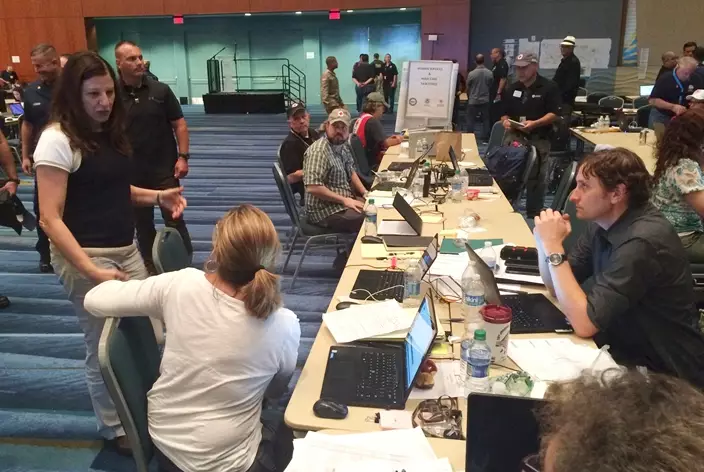
Acting Homeland Secretary Elaine Duke, left, talks to first responders during her visit Friday, Sept. 29, 2017, in Puerto Rico. President Donald Trump on Thursday cleared the way for more supplies to head to Puerto Rico by waiving restrictions on foreign ships delivering cargo to the island. (AP Photo/Luis Alonso Lugo)
In some cases, aid that was being distributed by the Federal Emergency Management Agency was simply not enough to meet demand on an island of 3.4 million people where nearly everyone was still without power, half were without running water in their homes and the economy was still crippled from the effects of the storm that swept across the U.S. territory as a fierce Category 4 hurricane on Sept. 20.
"I haven't seen any help and we're running out of water," said Pedro Gonzalez, who was clearing debris to earn some money in the northern coastal town of Rio Grande. Increasingly desperate and with a daughter with Down syndrome to support, he had already decided to move to Louisiana to stay with relatives. "We're getting out of here."
FEMA sent Rio Grande officials shipments of food and water for the past three days and arrived Thursday to help distribute meal packets, water and snacks in one community. But people in nearby neighborhoods complained that they weren't told about the aid.
"This has been a complete disaster," said 64-year-old retiree Jenny Cordero as she filled plastic trash cans with water at the home of a neighbor who was among the lucky ones to have service restored.
Those who made it, however, were grateful. "This will help somewhat, so we don't starve," said Anthony Jerena, a 33-year-old father of two teenagers who managed to get two boxes of water, each containing 24 bottles and, three packages of meals-ready-to-eat.
Yolanda Lebron, a spokeswoman for the Rio Grande mayor, said they used a car with a loudspeaker to announce that FEMA would be registering people for aid, but did not mention there would be food and water given out. "We didn't dare," she said. "We didn't know if we were going to have enough."
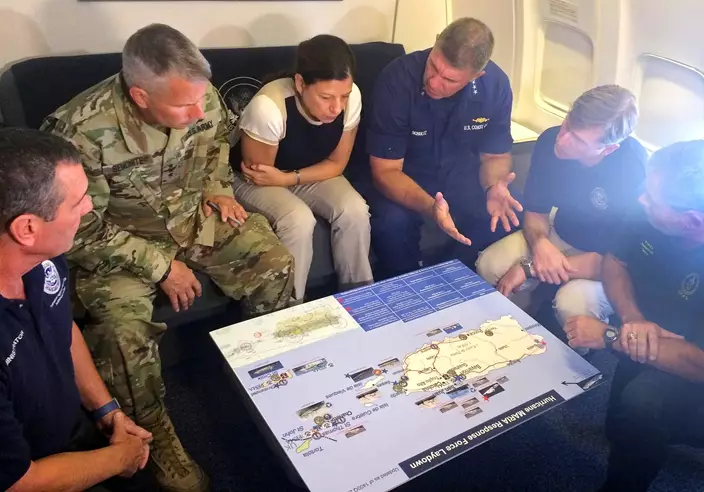
Acting Homeland Secretary Elaine Duke, center, is briefed on the Hurricane Maria response during a flight to Puerto Rico on Friday, Sept. 29, 2017. President Donald Trump on Thursday cleared the way for more supplies to head to Puerto Rico by waiving restrictions on foreign ships delivering cargo to the island. (AP Photo/Luis Alonso Lugo)
Gov. Ricard Rossello and other officials said they were aware of people's deepening frustration and of the difficulty, and danger, of living on a sweltering tropical island with no air conditioning and little to no water. He blamed some of the delay on the logistical challenge of getting aid shipments out of the seaports and airports, which were knocked out of commission in the storm, and then distributing the supplies on debris-strewn streets.
Rossello said Friday that the government would seize all food still sitting in containers at the port that private business owners had not yet claimed and would distribute it to people for free. He said the government would use FEMA funds to repay the owners.
He said operations were also ramping up at the airport and that the government had requested drivers and other workers from various federal agencies to help distribute aid, which he expected to begin flowing within the next several days. "We know we have to do more," he said. "We're still not getting at the optimal point. But it has been a limitation on logistics and as soon as we get those assets we are going to put them on the ground."
The governor also said he would shorten the nightly curfew by three hours, requiring people to be off the streets by 9 p.m. instead of 7 p.m., and would end a ban on alcohol sales that was in place since before the storm.
He spoke after touring the island with Acting Secretary of Homeland Security Elaine Duke, who drew criticism from the San Juan mayor and others for describing the recovery effort as a "good-news story." She sought to clarify the statement, saying she intended to praise the cooperation among the federal and local authorities in responding to a crisis.
"Clearly the situation here in Puerto Rico after the devastating hurricane is not satisfactory, but together we are getting there and the progress today is very, very strong," she said.
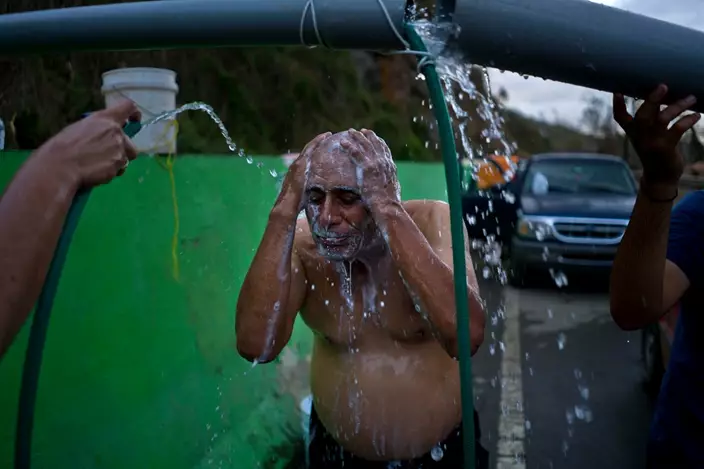
People affected by Hurricane Maria bathe in water piped from a creek in the mountains, in Naranjito, Puerto Rico, Thursday, Sept. 28, 2017. Residents of the area drive to the pipes to bathe because they were left without water supplies by the damage caused by Hurricane Maria. (AP Photo/Ramon Espinosa)
There were signs that the island was slowly emerging from the disaster.
Telecommunications were back for about 30 percent of the island, giving some people the critical ability to call relatives and others for help if needed. Nearly half of the supermarkets had opened, at least on reduced hours, and about 60 percent of the gas stations, though it could take hours to buy a rationed amount. In San Juan, the news that a laundromat had reopened cheered some, as did the news that some buses and the rideshare service Uber would be back online in San Juan.
Meanwhile, FEMA officials said the agency had distributed 2.5 million liters of water and 2 million meals at 11 distribution centers including the nearby islands of Culebra and Vieques. Nearly 1,700 Department of Defense personnel were on the island and 3,000 more were expected in upcoming days.
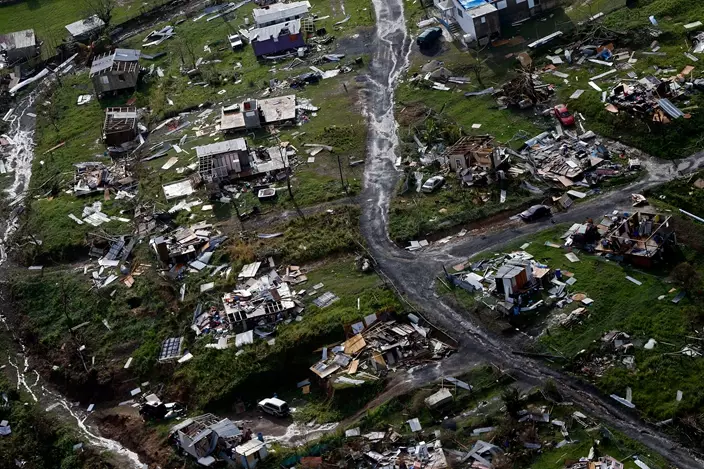
Destroyed communities are seen in the aftermath of Hurricane Maria in Toa Alta, Puerto Rico, Thursday, Sept. 28, 2017. The aftermath of the powerful storm has resulted in a near-total shutdown of the U.S. territory’s economy that could last for weeks and has many people running seriously low on cash and worrying that it will become even harder to survive on this storm-ravaged island. (AP Photo/Gerald Herbert)
Despite the easing of the aid distribution bottleneck, water was the greatest need cited by nearly everyone. Those lucky enough to have had service restored to their homes said it was sporadic so that authorities could ration it around the country.
In the southern coastal town of Santa Isabel, 60-year-old Lebron Eduardo said he came each day to a pumping station at the water agency for supplies. "It's not reaching the neighborhood," he said.
Nearby, 25-year-old Jorge Ortiz was taking a shower on the side of the road using well water. "People come to get water for their families. The children are bathing and neighbors are cooking," he said. "Apart from the bad experience of the hurricane, is something that is uniting us."




